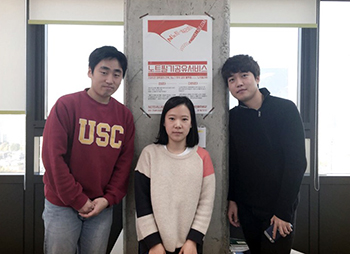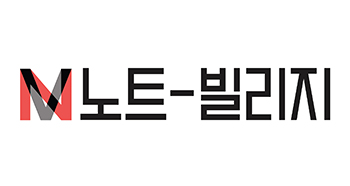
Platforms designed for selling and buying lecture notes are emerging with an increase of students’ demands. The startup Note Village launched in March this year by three KAIST students: Kim Ju-yeon, Jeon Seung-hwan, and Song Jeon-ik.
These students met in a startup introductory class and began to think about an item that was closely related with students’ campus life. An online platform where students can buy notes of the classes they missed was what they came up with. Note Village is now carrying out its services at Ewha, Seoul National, KAIST, Yonsei, Korea, and Sogang University with plans to expand their services to more schools.
As a pioneer of such market, they had to contemplate on how much would be considered as an appropriate price for a note taken in one class.
“We fixed the price to 2,500 won per note, based on how students usually offer a cup of coffee to express their gratitude for providing them notes,” Jeon said. “We carried out group interviews and surveys, showing that 2,500 won would be the adequate price.”
Note Village has fixed note providers who upload their notes in good quality for a whole semester. Their notes are currently available for free in the trial subscription. After the trial period is over, Note Village plans to set the fixed note providers’ price at a cheaper level than other notes. The fixed note providers would also receive incentives according to their note sales.
However, the idea of taking lecture notes into the market and dealing it as a product raised repulsion among some people. Some questioned the service’s negative effects on academic integrity as students with better financial status can have more chances to buy academic materials for their studies. Although Note Village understood these possible points of concern, they maintained that dealing with notes had always been a solid part of campus.
“There have always been students provided with notes and materials from their seniors or fellow students in return for small gifts or a meal, ” Jeon said. “We believed that it is unfair that students who do not have personal connections cannot even get the chance to be provided with such resources. Our service had simply surfaced the underground market.”
“There were classmates offering me small coupons or gift certificates for notes they have missed,” said Kim Ji-hee, a student majoring in English Literature. “I do understand that it may be a controversial topic, but I also believe that it would be a necessary platform to support students looking for notes but does not have anyone to ask for.”
Besides the matter of unequal accessibility, the copyright issue was another controversy that aroused as some questioned to whom the right goes to since the lecture belongs to the professor.
“The copyright issue was the biggest obstacle that we had to overcome on starting our business, especially because students were reluctant to use our service in concerns of violating the law,” Jeon said. “However, after discussing the matter with experts, it turned out that unless the note is taken word-by-word, the student who took the note possesses the copyright for it.”
Starting off with overcoming controversies, Note Village has already passed an exam period successfully with number of satisfied users.
“The feedbacks we received were mostly about our business lacking the potential to make money, but our goal is to support students’ campus life,” Jeon said. “We are now focusing on expanding our services to more universities. Also, creating a time table service and a database of previous tests are well under way.”


